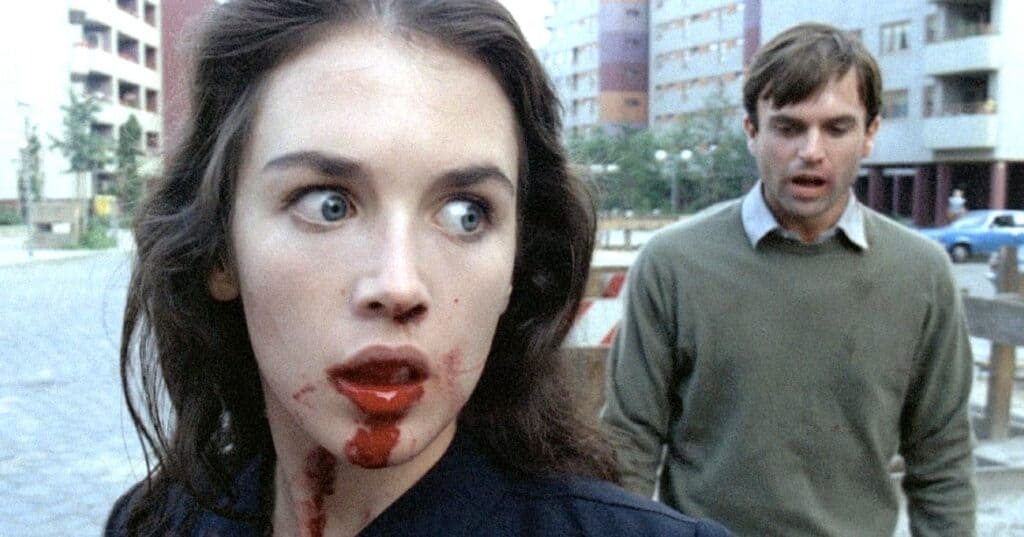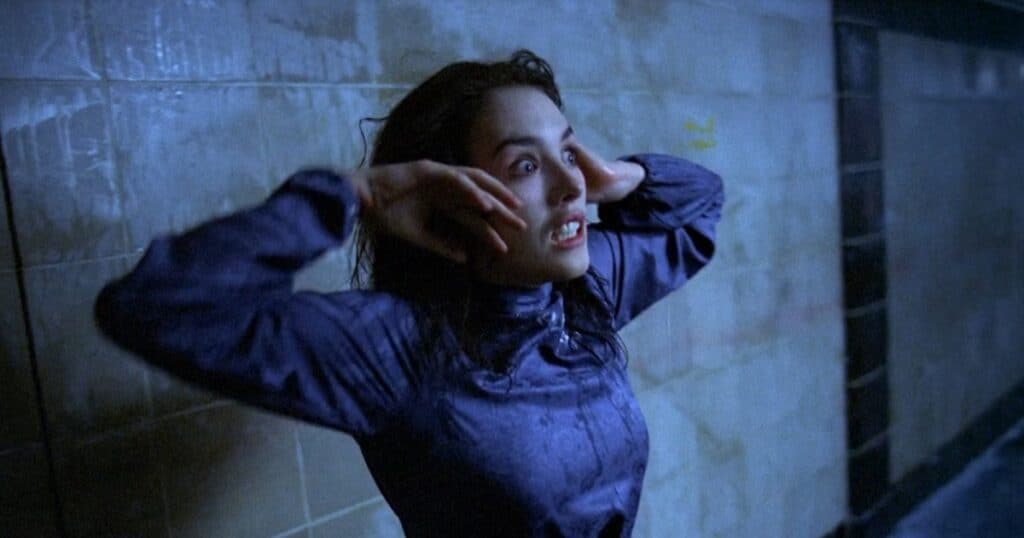
The Possession episode of Revisited was Written and Narrated by Vannah Taylor, Edited by Paul Bookstaber, Produced by Tyler Nichols and John Fallon, and Executive Produced by Berge Garabedian.
Critics once called it “too vulgar for arthouse, too pretentious for grindhouse.” A body horror film that’s not really horror, the most depressing break-up movie, a socio-political drama that ends in apocalyptic hysteria. It is hard to believe that this is all contained into one film. The most bizarre psychological thriller you can lay your eyes on is a horrifying and captivating film that oozes chaos and defies categorization: Andrzej Zulawski’s 1981 cult film, Possession.
Zulawski was a Polish film director born in Soviet Ukraine but moved to France after his film The Devil was banned by the Polish government and landed him in jail. His next film was again halted by authorities, causing him to lose his right to work in Poland–all while his marriage was falling apart. And here lies the inspiration behind Possession–making it a gut-wrenchingly perfect double feature with a film like The Brood, where we also see David Cronenberg’s own divorce and custody battle manifest into on screen grotesqueries. However, Zulawski’s film, as well as Cronenberg’s, is more than just a rehashing of his own feelings about his marriage–he takes inspiration from the crumbling of his own life and elevates what could have been the plot of a melodramatic soap opera into a bloody and painful film that forces you to stare into the eyes of God.
After premiering at Cannes, the film was subject to censorship and heavy criticism. In the UK, almost 30 minutes of the film was cut, but then British censors still deemed the film worthy of the infamous “Video Nasties” and thus, it was banned. It was even worse in the United States. Worried about the subject matter and a narrative that did not follow the conventions of Hollywood, Possession was edited down to an 80 minute version that was considered incoherent by audiences and critics…shocker!! This version, which released on Halloween-eve 1983 made about $1.1 million in the box office–which certainly did not earn it the title as a success against its $2.4 million budget. Luckily, the home video market allowed for the film to continue in the shadows as a cult classic. In the decades that followed the initial release, more and more audiences would finally get their eyes on this intoxicating film in the form of physical media–as well as a restoration by Metrograph in 2021.
So now that this iconic film has permeated its way into the public mind what is Possession really about?

Starring Sam Neill and Isabelle Adjani, the film immediately opens on Mark coming home to Anna, his wife, and their child Bob. Before he has even put his bags down, Anna is telling him that the marriage is over. Mark is a spy of some sort and has just come home from one war and stepped into another war taking place right under his own roof. Other than Mark’s discovery that she had been having an affair with the eccentric Heinrich, not much else is revealed about why their marriage is ending. The audience is left only to infer from how they behave towards one another, and the nature of Mark’s work taking him away from home for long periods, to make our judgements about the health of the relationship before being dropped into this nightmare.
Mark and Anna come in and out cohabiting, in between their distinct binges where they disappear for days at a time–but the tension is so thick, that even poor little Bob asks to play outside as soon as he feels the temperature of the room shift when his dad returns home. Mark is unable to cope with the lies and the infidelity on Anna’s part–taking every chance he has to interrogate her, corner her, grab on to her, and suffocate every frame of the film. The cinematography by Bruno Nuytten is kinetic, dizzying and intimate–perfectly capturing the insane pas de deux that Niell and Adjani’s character’s do with one another. Their relationship becomes an all consuming void that pushes each of them to violent extremes, self-destruction, and madness. The more Mark tries to maintain his possession over Anna, the more she writhes and screams and runs from her life with Mark.
Which brings me to the film’s title. Every word spoken by the characters of this film is like a riddle. You can take everything or nothing at face value–making it difficult for first time viewers to get a handle on what is really happening. The title itself is part of that riddle. Does it refer to possession in the sense of Mark and Anna’s marriage, the ownership of one another that comes with matrimony? Does it refer to possession by a supernatural entity? If so, who is possessed? What is possessing them? I would probably answer yes to all of the above. There is a possession over one another. Both Mark and Heinrich are attempting to claim their possession over Anna. Even a random man on the subway helps himself to the banana in her grocery bag. And there is certainly some sort of all-possessing force that comes over Anna in key moments of the film, like when she animalistically contorts on the damp floors of the subway. In a scene that Adjani has described as “emotional pornography,” Anna rolls around, thrashing and smashing the groceries she carries with her. Screaming, laughing hysterically, slamming into walls and losing all control. The scene climaxes with her knelt on the grimy floor, blood and puss and a cocktail of bodily fluid oozes from every orifice in a scene of complete abject horror. This is referred to as her miscarriage and what is born is the creature that continues to take shape.
Mark watches a home video taken of one of Anna’s dance classes, before she stopped her career as a ballet teacher–which is an interesting detail about her character, in relation to how it plays with other films about ballet dancers and doppelgangers like Black Swan. When she describes to Mark what happened to her in the subway, finally trying to convey to him the reality if what has been happening, stating that “What I miscarried there was Sister Faith,” and that what was left in her was Sister Chance–we are reminded of the monologue she gives about Sister Faith and Sister Chance at the end of that home video. Sister Chance is chaos, unpredictability, a meaningless existence, leaving Anna destructive, spiraling, and unable to find stability. She then explains that she must now take care to protect her faith, referring to the monster in that grim apartment by the wall.

The tentacled monster, designed by the talented Carlo Rambaldi who has worked on the creature effects of dozens of films including E.T., Close Encounters of the Third Kind and even Dune, eventually takes its final form as a doppelganger of Mark, with bright green eyes similar to Helen’s–Bob’s school teacher and doppelganger of Anna that Mark meets earlier in the film. Doppelganger’s themselves are typically thought of as evil, bad omens, or even harbingers of death–which we can’t entirely rule out as the sirens that end the film don’t necessarily bring feelings of joy–but doppelgangers can also be seen as manifestations of desire. This is certainly true of Helen for Mark. Anna has just told Mark she has been unfaithful, she leaves Bob unattended and disappears while the apartment is left in disarray. She even puts the words in his mouth that she is “a monster, a whore.” When he meets Helen, despite being Adjani in contacts and a wig, she is presented in a white dress and with softer features–a more classic idea of femininity. When she comes to the apartment, she does everything he wishes Anna would–she reads to Bob and puts him to bed, she cooks and cleans and lays naked in bed with him. Helen is his complete fantasy, an idealized version of his wife. At least, she is a manifestation of the inner turmoil that Mark is experiencing–which puts into perspective the presence of Mark’s doppelganger. This final manifestation, and the doom that permeates from the film’s finale, give perspective into the intensity of the inner pain and suffering that haunted Anna’s psyche.
All of these feelings that the film forces to brew inside your skull, are bolstered by the muted tones of a desolate Berlin. The coldness radiates from the film itself, causing feelings of isolation and imprisonment similar to what the characters are feeling. Anna and Mark’s separation is also symbolic of this separated city, and the film plays on the anxieties of a Cold War-era Berlin–especially with its apocalyptic ending. Berlin itself is also considered a stand in for Zulawski’s home nation and the political history of Poland. The theme of separation continues as he himself is separated from his county.
Despite its rocky beginnings, Possession is a widely cherished film. While Zulawski was both praised and condemned for his unrelenting and mentally exhausting film, Isabelle Adjani won best actress at the Cannes Film Festival for her raw vulnerability with Anna–a performance that is key in the legacy of the film. Not only do I have yet to find another woman in the horror space that does not find something in Anna that resonates, but the imagery of the iconic subway scene continues to be recreated in music videos, like Massive Attack’s music video starring Rosamund Pike, fashion shows, television shows, and in film. The most recent homage to Possession came in the form of Nell Tiger Free’s jaw dropping performance in The First Omen as she begins to give birth to the Antichrist. The resilience of films like Possession, show that no matter how much censors try to take control, the hunger for these seminal horror touchstones will always win.
There is so much to unpack in a film that knows no bounds and defies genre like Possession. A dysfunctional relationship, both referring to Anna and Mark’s marriage and a divided Berlin. A gooey and visceral tentacled monster. Love and violence, sexuality and repression–I mean, we haven’t even touched on the man with the pink socks–Possession is a film whose tentacles are continuously unwinding and recoiling in new configurations. Disturbing and profound, Possession will forever remain a part of horror history.
Two previous episodes of Revisited can be seen below. To see more of our shows, head over to the JoBlo Horror Originals channel – and subscribe while you’re at it!
The post Possession (1981) Revisited – Horror Movie Review appeared first on JoBlo.
Leave a Reply